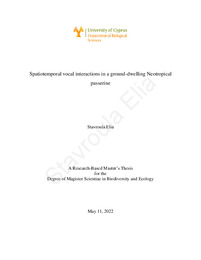Spatiotemporal vocal interactions in a ground-dwelling Neotropical passerine

Προβολή/
Ημερομηνία
2022-05-11Συγγραφέας
Elia, StavroulaΕκδότης
Πανεπιστήμιο Κύπρου, Σχολή Θετικών και Εφαρμοσμένων Επιστημών / University of Cyprus, Faculty of Pure and Applied SciencesPlace of publication
CyprusGoogle Scholar check
Keyword(s):
Metadata
Εμφάνιση πλήρους εγγραφήςΕπιτομή
In many species, communication involves an exchange of information between the sender and the receiver, by using different types of signals. Among the different types of communication, acoustic communication has been studied for many decades and much of that work has been on bird song. Birds can communicate information across vast distances through song, which is mostly used for mate attraction and territory defence. The majority of studies on bird song focuses on oscine passerines, with suboscines receiving little attention, and little is known regarding song interactions within and among the sexes in suboscines. There is also an important gap in knowledge
regarding the possible presence of a domino effect in singing behaviour between individuals during the dawn chorus and about differences in the singing activity of both sexes during the day. In this study, I investigated spatiotemporal interactions in the Mexican antthrush (Formicarius moniliger), a suboscine passerine in which both sexes sing and defend year-round territories. More specifically, I investigated the effect of sex, testosterone levels and time of day on singing activity of males and females and whether duetting occurs in this species. I also investigated the effect of presumed territory intruders on singing activity of territory holders through playback experiments.
The effect of vocalizing individuals on the singing activity of neighbouring birds during the dawn chorus was also examined. For the purposes of the study, I analysed recordings of songs of the Mexican antthrush obtained from eight Song Meter autonomous recording devices, which were placed in territories within the study population. In Mexican antthrushes duetting does not occur and males sing more on average than females, with testosterone found to have a negative effect on female but not male singing activity. Also, singing activity is higher at dawn and decreases through the day, with song levels greater when neighbours are also singing, suggesting that domino effect occurs. Also, the playback experiments, resulted in significantly more responses from ringed individuals to female song over no playback. The pattern of singing activity in relation to time of day, indicates possible territory defense and mate attraction then and increased foraging activity at later times. The importance of territory defense and mate attraction is also highlighted from the results of the playback experiments. The positive effect of singing neighbours in the singing activity of the individuals indicates a strong social effect in the Mexican antthrush, as has been found in other species. Thus, in the Mexican antthrush, combined with a pattern of a domino effect, singing activity increases in the presence of conspecific vocal activity from neighbours and presumed intruders. Furthermore, stronger responses were found to female song playback overall, and females sang significantly more when neighbouring males were singing, suggesting the possibility that neighbouring individuals of the opposite sex may be interacting.
